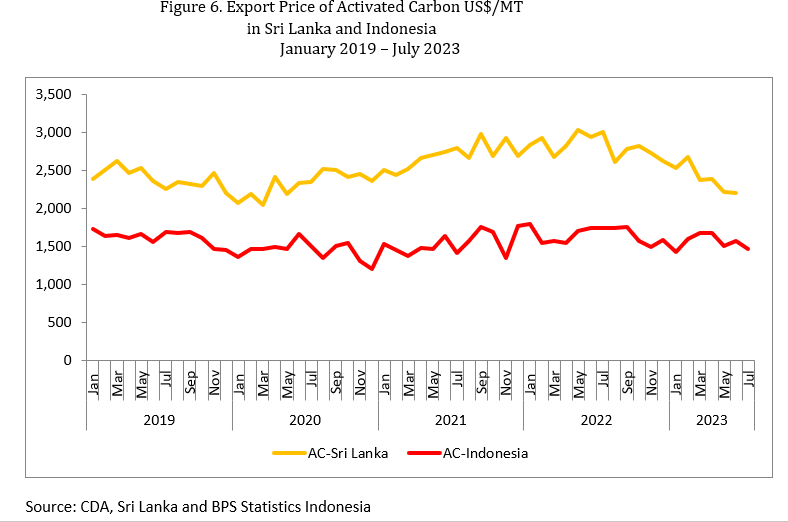- Home
- Statistics
- Market Review
Market Review of Coconut Activated Carbon
August 2023
The global activated carbon market is poised for a deceleration in 2023 due to heightened economic instability on a global scale. Notably, during the January-July period of 2023, India, a prominent producer of activated carbon, recorded a 12.9% reduction in export volume compared to the corresponding period in the previous year. In the preceding year, exports from India reached 154,423.88 tons, representing a robust 17.6% increase, amounting to a value of US$311.80 million. During the first half of 2023, India exported activated carbon to 141 nations worldwide, with the United States maintaining its position as the primary importer. Germany, Turkey, Russia, Japan, and Belgium also featured prominently among importers of Indian activated carbon.
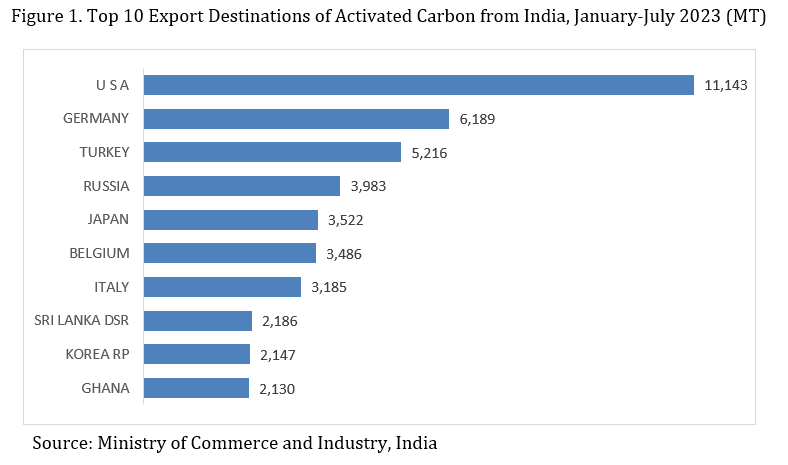
Sri Lanka, another significant producer of coconut shell-based activated carbon, encountered a negative trend in 2023, with export volume declining by 5% and earnings from activated carbon exports decreasing by 21% during the January-July period, as compared to the same period in 2022. Key importers of Sri Lankan activated carbon included the United States, China, Germany, Japan, and the United Kingdom.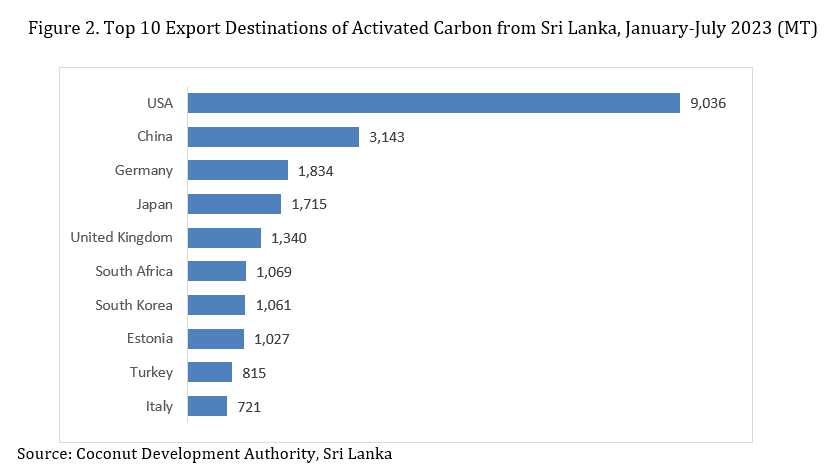 The Philippines similarly experienced a reduction in activated carbon exports, with shipments totaling 27,001 tons in the January-May 2023 period, down from 34,779 tons in the corresponding period of 2022. Key importers of Philippine activated carbon encompassed Japan, Germany, the United States, South Korea, and China. This decline in exports can be primarily attributed to diminished demand in importing countries resulting from economic slowdown.
The Philippines similarly experienced a reduction in activated carbon exports, with shipments totaling 27,001 tons in the January-May 2023 period, down from 34,779 tons in the corresponding period of 2022. Key importers of Philippine activated carbon encompassed Japan, Germany, the United States, South Korea, and China. This decline in exports can be primarily attributed to diminished demand in importing countries resulting from economic slowdown.
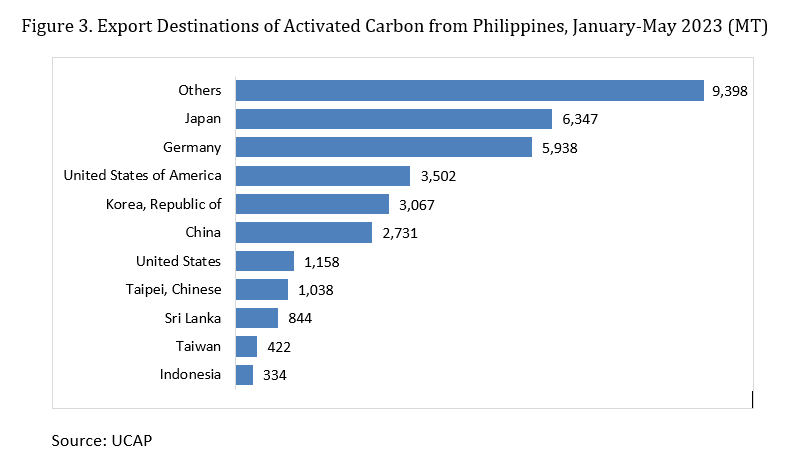
Indonesia, another notable producer of coconut shell-based activated carbon, displayed a declining trend during the January-July 2023 period, with a 12% decrease in activated carbon exports compared to the preceding year. Indonesia exported 10,623 tons of activated coconut shell charcoal-based carbon during this period, garnering export earnings of US$16.5 million.
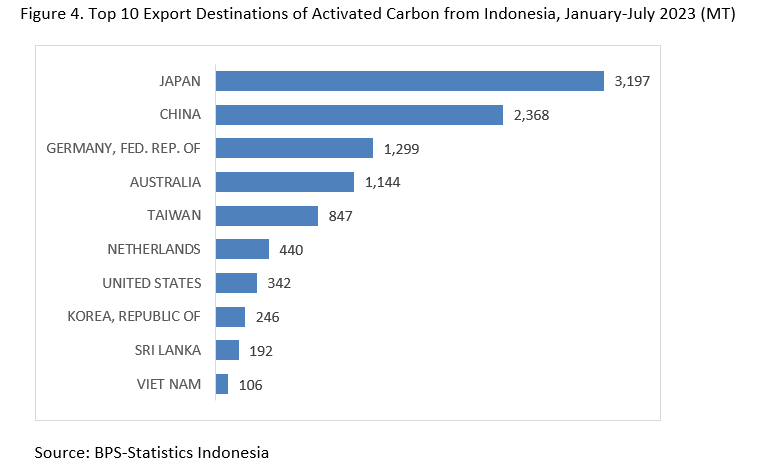
On the demand front, the United States, the largest importer of coconut shell-based activated carbon, saw a significant 24.6% reduction in imports during January-July 2023. It is worth mentioning that the U.S. import volume of activated carbon stood at 66,470 tons in 2022, reflecting a substantial 45% increase from the previous year. This decline in import activity can be largely attributed to the prevailing economic slowdown in the country.
In parallel, Japan recorded a 6% decrease in activated carbon imports during the January-July 2023 period compared to the corresponding period in 2022. In 2022, Japan imported 86,191 tons of activated carbon, valued at US$168.17 million, marking a 2% increase from the previous year. The demand for activated carbon in Japan is driven by increased usage in water treatment and air purification, along with the expansion of the food and beverage processing industry.
In the context of diminished demand for activated carbon, the price of coconut shell charcoal as the primary raw material for carbon production experienced a downward trajectory across various producing nations. Over the period from January to July 2023, the price exhibited a downward trend in the Philippines, Sri Lanka, and India, while remaining relatively stable in Indonesia. Prices for charcoal ranged from US$325/MT to US$466/MT in July 2023, underscoring the diversity of this market commodity.
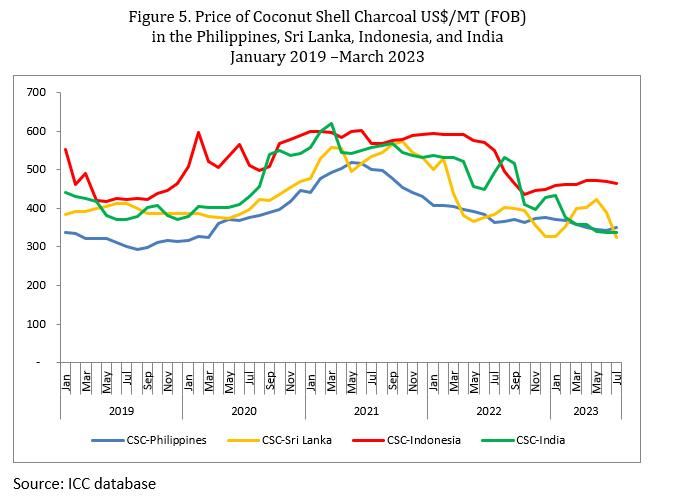
Conversely, the export price of activated carbon demonstrated fluctuating patterns during the first half of 2023. For instance, in Indonesia, the price escalated from US$1,433/MT in January 2023 to US$1,675/MT in April 2023, only to decrease to US$1,468/MT by July 2023. Similarly, the price of activated carbon in Sri Lanka saw a decline from US$2,533/MT in January 2023 to US$2,397/MT in July 2023, reflecting a pronounced downtrend. These price fluctuations can be attributed to a range of factors, including shifts in demand and supply, production costs, and global economic conditions.
